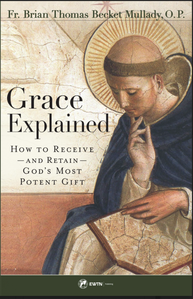
Grace is one of the most enigmatic concepts of our Faith. Yet it is uniquely and wonderfully woven into all that we do and believe as Catholics. In these pages, Fr. Brian Mullady provides one of the clearest and most luminous explanations of grace ever written, employing the same everyday Catholic language that has made him so popular as an EWTN guest and retreat master. God created Adam and Even to walk and talk in intimacy with Him in the garden. Our highest calling is to return to that state of perfect holiness, which we can achieve only by relying on God's sanctifying grace. Perfect holiness is not only possible but essential if we wish to achieve eternal life. That's why Fr. Mullady has written this accessible and practical guide - to help you understand how grace is working in your life presently and to teach you how to seize all the unclaimed graces God is offering you throughout each day. You'll learn how the action of the Holy Spirit comes from within the very character of your being and how to improve your openness to each of the three types of grace. You'll explore the time-tested methods for practicing the three counsels of perfection and how to employ remedies against the three great weaknesses of our nature. You'll also learn: How grace perfects - and does not destroy nature Precisely what you must do to make yourself more open to grace The three types of grace and how to magnify them Why God uses mediators of grace even though He is the source of grace Why God expanded the Israelites' knowledge of right and wrong (and thus their culpability) but did not communicate grace to them Two theological errors that most people of good will mistakenly believe The three states of nature on which even the workings of God depend How grace operates in our daily lives to bring us closer to each person of the Trinity Intimacy with God is man's highest calling. We can achieve it by relying on God's sanctifying grace, which gives us the fullness of life and makes us holy. Accessing the graces we've been overlooking is how we discover what it means to be truly human, for, though we all possess natural life, it is only through grace that man is fully alive.
CLICK HERE TO ORDER ON AMAZON
Or CLICK HERE FOR AMAZON USA
CLICK HERE TO ORDER ON AMAZON
Or CLICK HERE FOR AMAZON USA
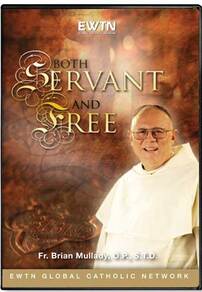 Click on picture to buy
Click on picture to buy
BOTH SERVANT AND FREE – FOUR DVDS
Father Brian Mullady, O.P., S.T.D., presents an in-depth study of the moral doctrine of the Church vis-a-vis the moral problems our post-Vatican II era faces. Issues such as conscience, freedom, law and the formation of moral maturity. Home Video series. 4 discs. / 6 1/2 hrs. CLICK HERE TO BUY
Father Brian Mullady, O.P., S.T.D., presents an in-depth study of the moral doctrine of the Church vis-a-vis the moral problems our post-Vatican II era faces. Issues such as conscience, freedom, law and the formation of moral maturity. Home Video series. 4 discs. / 6 1/2 hrs. CLICK HERE TO BUY
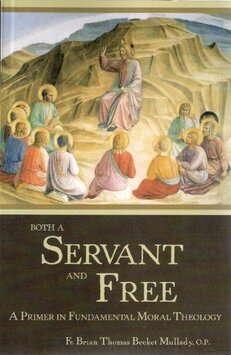 Click here to buy on Amazon
Click here to buy on Amazon
Both a Servant and Free: A Primer in Fundamental Moral Theology
Man is at the same time “both a servant and free.” This text from St. Augustine is an excellent summary of the traditional Catholic teaching on moral theology. Since the sixties, there have been many theologians who believe that the traditional systematic approach of Catholic theology, which emphasizes man’s service of the Natural Law coupled with his freedom as a Person, could not be sustained.So great has this skepticism become, that Pope John Paul II felt called to write an encyclical, Veritatis Splendor, on the very subject of absolutes in morality.
It is no great secret that it was the papal teaching on birth control which was the original source of the rejection of moral absolutes. Moralists have been dancing a tightrope since 1968 trying to show how Humanae Vitae could be wrong and yet preserve some sense of moral order in the universe and in human society. When confronted with their destructive opinions, their usual retort is that no one understands what they are actually saying. The sad truth is that Humanae Vitae was just the tip of the iceberg. Contemporary theology has rejected the traditional philosophia perennis of the scholastic theologians across the board.
Given all these difficulties, it is no wonder that the beginning student in moral theology is confused. I have heard students in many seminaries lament for years that there is no truly understandable moral theology textbook in which they can discern a systematic unity of the Magisterial teaching of the Popes, the emphasis on the human person in the Second Vatican Council, and the Scholastic tradition. In addition, many traditional Catholic moralists lament the lack of a complete teaching on the virtues and the inclusion of the ultimate end and the doctrine of grace in former manuals of moral theology. This should also be remedied in any new book written on fundamental moral theology. It is high time that such a book be written, especially since the publication of the Catechism of the Catholic Church and Veritatis Splendor.
The real difficulty in moral theology has always been to preserve a healthy respect for the law (the servant aspect) while also encouraging the interior formation in love which the truth of the law seeks to inculcate in human life (the aspect of freedom). Modern moralists have tried to play one off against the other. Moral theology, however, cannot be an either/or. Moral teaching, indeed all Catholic theology, must be a both/and. In this book, I will try to show the fullness of the Catholic synthesis which, based on an authentic picture of the human soul, seeks to direct man to a true experience of being both truthful and loving, both law-abiding and Spirit-filled, both obedient to absolute moral norms and freely pursuing heaven, BOTH A SERVANT AND FREE! Available on Amazon Here
Man is at the same time “both a servant and free.” This text from St. Augustine is an excellent summary of the traditional Catholic teaching on moral theology. Since the sixties, there have been many theologians who believe that the traditional systematic approach of Catholic theology, which emphasizes man’s service of the Natural Law coupled with his freedom as a Person, could not be sustained.So great has this skepticism become, that Pope John Paul II felt called to write an encyclical, Veritatis Splendor, on the very subject of absolutes in morality.
It is no great secret that it was the papal teaching on birth control which was the original source of the rejection of moral absolutes. Moralists have been dancing a tightrope since 1968 trying to show how Humanae Vitae could be wrong and yet preserve some sense of moral order in the universe and in human society. When confronted with their destructive opinions, their usual retort is that no one understands what they are actually saying. The sad truth is that Humanae Vitae was just the tip of the iceberg. Contemporary theology has rejected the traditional philosophia perennis of the scholastic theologians across the board.
Given all these difficulties, it is no wonder that the beginning student in moral theology is confused. I have heard students in many seminaries lament for years that there is no truly understandable moral theology textbook in which they can discern a systematic unity of the Magisterial teaching of the Popes, the emphasis on the human person in the Second Vatican Council, and the Scholastic tradition. In addition, many traditional Catholic moralists lament the lack of a complete teaching on the virtues and the inclusion of the ultimate end and the doctrine of grace in former manuals of moral theology. This should also be remedied in any new book written on fundamental moral theology. It is high time that such a book be written, especially since the publication of the Catechism of the Catholic Church and Veritatis Splendor.
The real difficulty in moral theology has always been to preserve a healthy respect for the law (the servant aspect) while also encouraging the interior formation in love which the truth of the law seeks to inculcate in human life (the aspect of freedom). Modern moralists have tried to play one off against the other. Moral theology, however, cannot be an either/or. Moral teaching, indeed all Catholic theology, must be a both/and. In this book, I will try to show the fullness of the Catholic synthesis which, based on an authentic picture of the human soul, seeks to direct man to a true experience of being both truthful and loving, both law-abiding and Spirit-filled, both obedient to absolute moral norms and freely pursuing heaven, BOTH A SERVANT AND FREE! Available on Amazon Here
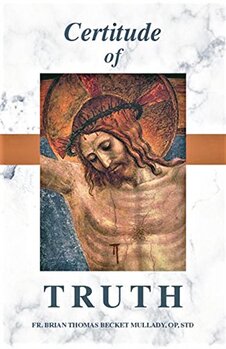 Click on Picture to buy on Amazon
Click on Picture to buy on Amazon
Certitude of Truth
\Mullady, OP. Each chapter in this short, very readable book explores and summarizes one among Pope Benedict XVI’s numerous published works. Topics included are as varied as the liturgy, Christ, philosophy, the relation of faith to reason, moral theology, and conscience. The intended audience is not only those who are specialists in theology. Rather, the author speaks to the ordinary modestly-educated Catholic. Because all can benefit from reading Pope Benedict’s work, this book is designed to encourage an encounter with the original texts. “This small book offers, with the guidance of Pope Benedict, a remarkable survey of modern thought: how we got to where we are, where we went awry, and what we might do to get back on track!”— Fr. Reginald Martin, OP. CLICK HERE TO BUY ON AMAZON
\Mullady, OP. Each chapter in this short, very readable book explores and summarizes one among Pope Benedict XVI’s numerous published works. Topics included are as varied as the liturgy, Christ, philosophy, the relation of faith to reason, moral theology, and conscience. The intended audience is not only those who are specialists in theology. Rather, the author speaks to the ordinary modestly-educated Catholic. Because all can benefit from reading Pope Benedict’s work, this book is designed to encourage an encounter with the original texts. “This small book offers, with the guidance of Pope Benedict, a remarkable survey of modern thought: how we got to where we are, where we went awry, and what we might do to get back on track!”— Fr. Reginald Martin, OP. CLICK HERE TO BUY ON AMAZON
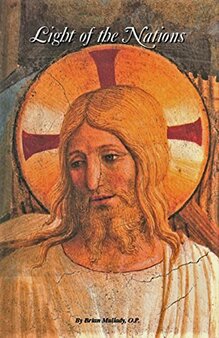 Click on picture to buy on Amazon
Click on picture to buy on Amazon
Light of the Nations
What better commendation for Light of the Nations by Fr. Brian Mullady, OP. than Scott Hahn’s words: “Fr. Mullady offers a readable and rock-solidly reliable treatment of what is surely the most important – and debated – subject in contemporary Catholic theology. His approach to the doctrine of the Church (ecclesiology) demonstrates the profound consistency and coherence of the Magisterium’s teaching, as it draws from biblical and patristic sources and develops from the medieval to the modern period, culminating in Vatican II’s Dogmatic Constitution on the Church (Lumen Gentium). In the process, Fr. Mullady applies a ‘hermeneutic of continuity’ to show the deep convergence of Vatican I and Vatican II (no small feat!). Along the way, readers gain a renewed sense of the indispensable role of classical Thomism for doing Catholic theology – with precision, fidelity and flexibility” Available on Amazon here
What better commendation for Light of the Nations by Fr. Brian Mullady, OP. than Scott Hahn’s words: “Fr. Mullady offers a readable and rock-solidly reliable treatment of what is surely the most important – and debated – subject in contemporary Catholic theology. His approach to the doctrine of the Church (ecclesiology) demonstrates the profound consistency and coherence of the Magisterium’s teaching, as it draws from biblical and patristic sources and develops from the medieval to the modern period, culminating in Vatican II’s Dogmatic Constitution on the Church (Lumen Gentium). In the process, Fr. Mullady applies a ‘hermeneutic of continuity’ to show the deep convergence of Vatican I and Vatican II (no small feat!). Along the way, readers gain a renewed sense of the indispensable role of classical Thomism for doing Catholic theology – with precision, fidelity and flexibility” Available on Amazon here
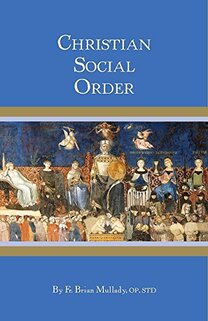 Click on picture to buy on Amazon
Click on picture to buy on Amazon
Christian Social Order
A remarkable presentation of the Church’s teaching on the necessary role community plays in the Church, the State and the family… Readers unfamiliar with classic philosophical and theological notions of the human person will find the work’s opening sections quite revealing; those brought up in the Catholic tradition will find these pages a splendid synthesis of the traditional Western thought. When they come to the second half of the book, all readers will stand in awe of Fr. Mullady lucid presentation of Marriage and Family, which is appropriately argumentative, but neither defensive not belligerent… – Fr. Reginald Martin, OP.
ClICK HERE TO BUY ON AMAZON
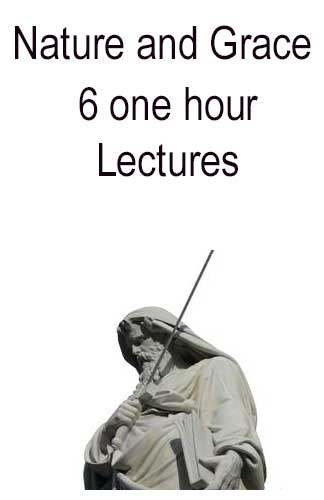 Click on Picture to buy
Click on Picture to buy
Nature and Grace -- 6 one hour Lectures
In this course, we will cover the major controversies regarding the proper way to understand the relationship between Nature and Grace. These different approaches to the question have had serious ramifications in various areas on theology; these too will be our concern in this course.
Six one hour Lectures
1. The Natural Desire to See God
2. Controversy Over the Desire to See God
3. The State of Human Nature
4. The Nature of the Law
5. The New Law of Christ — Sanctifying Grace
6. The Nature, Necessity, and Effects of Sanctifying Grace
Available on DVD or MP3 or CD CLICK HERE
In this course, we will cover the major controversies regarding the proper way to understand the relationship between Nature and Grace. These different approaches to the question have had serious ramifications in various areas on theology; these too will be our concern in this course.
Six one hour Lectures
1. The Natural Desire to See God
2. Controversy Over the Desire to See God
3. The State of Human Nature
4. The Nature of the Law
5. The New Law of Christ — Sanctifying Grace
6. The Nature, Necessity, and Effects of Sanctifying Grace
Available on DVD or MP3 or CD CLICK HERE
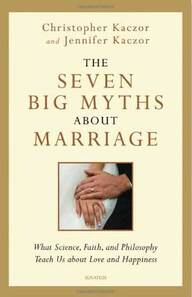 Click on picture to buy
Click on picture to buy
THE SEVEN BIG MYTHS ABOUT MARRIAGE
WHAT SCIENCE, FAITH, AND PHILOSOPHY TEACH US ABOUT LOVE AND HAPPINESS by Christopher & Jennifer Kaczor. This work explores some of the most interesting and vexing problems in contemporary life. Appealing to reason rather than religious authority, it tackles the most controversial and talked about positions of the Catholic Church – on contraception, on marriage, on reproductive technologies, on cohabitation, and on divorce – arguing for the reasonableness of the Church’s views on these issues. Finally the book explores the value of children. Hardcover. 210 pages. CLICK HERE TO BUY
WHAT SCIENCE, FAITH, AND PHILOSOPHY TEACH US ABOUT LOVE AND HAPPINESS by Christopher & Jennifer Kaczor. This work explores some of the most interesting and vexing problems in contemporary life. Appealing to reason rather than religious authority, it tackles the most controversial and talked about positions of the Catholic Church – on contraception, on marriage, on reproductive technologies, on cohabitation, and on divorce – arguing for the reasonableness of the Church’s views on these issues. Finally the book explores the value of children. Hardcover. 210 pages. CLICK HERE TO BUY

